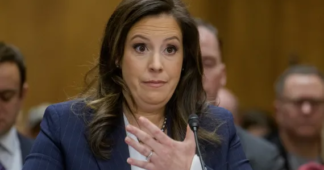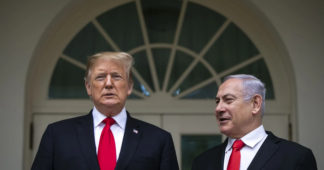By Marwan Emil Toubassi*
Since Donald Trump assumed the presidency for a second term, rapid developments have unfolded at the international, regional, and domestic levels. In this context, his inauguration speech was a grim spectacle filled with hate, a focus on national greatness, and divine promises. Like any new historical trend, opinions on its significance vary widely.
Trump attacked the previous administration, immigrants, large segments of Americans, Latin Americans, and the rest of the world.
Trump drew inspiration from Adolf Hitler’s first radio address in 1933, where Hitler criticized the previous regime and promised a new era of national greatness, wrapped in the guise of spreading peace. Trump echoed this vision using the term “Golden Age,” but in practice, his agenda serves an escalating fascist vision driven by the crisis of today’s capitalist system.
A Distorted and Hypocritical Middle East Policy
Trump’s administration charted a hypocritical, fascist, and ideologically extreme policy in the Middle East, combined with transactional deals and unwavering support for Israel and the concept of population transfer. This policy not only ignored Palestinian rights but also reinforced Israeli dominance while selling illusions through figures like Mike Boulos and Jason Greenblatt. Simultaneously, the U.S. showed no genuine interest in supporting an independent Palestinian state, thereby deepening Palestinian suffering and edging closer to eliminating the Palestinian cause.
False Promises and Mediators
In my view, Mike Boulos, a billionaire of Lebanese descent and Tiffany Trump’s father-in-law, played a role in making promises to Palestinians, suggesting a genuine opportunity for progress under Trump’s leadership. These promises followed a familiar American pattern of selling illusions to Palestinians, promoting hollow economic or political solutions without any substantive commitments. Similarly, Jason Greenblatt, Trump’s envoy to the Middle East, attempted to portray himself as a mediator with Palestinians, even expressing a willingness to visit Gaza. However, such gestures contradicted the administration’s policies that entrenched Israeli occupation, expanded settlements in the West Bank, and pursued annexation and absorption plans.
Israeli Dominance Within U.S. Strategy
The U.S.-Israel alliance is rooted in deep strategic interests, including religious and cultural considerations, which make the idea of an independent Palestinian state incompatible with American policy. Israel serves as a strategic base for Washington in the region, and strengthening its power aligns with U.S. interests.
This was evident in Trump’s support for Israeli settlements, relocating the U.S. embassy to Jerusalem, and recognizing the city as Israel’s unified capital. Additionally, the Trump administration approved the extension of Israel’s military presence in Lebanon beyond the truce agreement’s timeframe, emphasizing its long-term strategy.
Furthermore, Jordan was entirely sidelined by Trump’s agenda, facing economic pressure to align with his regional project, including resettling Palestinians from Gaza in Jordan. This proposal, which Jordan resisted during Trump’s first term, is being revisited, now accompanied by threats to cut aid to Jordan as a means of coercion.
The Role of Key Figures in U.S. Policy
U.S. Ambassador to Israel, Mike Huckabee, and the U.S. representative to the United Nations clearly reflected these policies. Huckabee, an evangelical hardliner, believes in the so-called “Biblical right” of Jews to the West Bank and refuses to call Israeli settlements by that name. Similarly, the U.N. representative’s statements emphasized this “right,” highlighting the ideological depth of U.S. decision-making.
The Ideological Dimension and Electoral Impact
Trump’s policies cannot be separated from his voter base, primarily Christian Zionists or Evangelicals, who view supporting Israel as a religious and ideological obligation. For them, the idea of “Greater Israel” is an integral part of their creed, explaining their unconditional support for Israel. This ideological influence was a major driver behind Trump’s administration adopting policies that fully served the Israeli project at the expense of Palestinian rights.
From the start of his presidency, Trump lifted sanctions on settlers, removed bans on arms shipments to Israel, and proposed forcibly relocating Palestinians, even suggesting “evacuating areas.”
Absence of Interest in a Palestinian State
A realistic assessment of Trump’s policy reveals that his administration, like its predecessors, saw no genuine interest in supporting the establishment of a Palestinian state or enabling Palestinians to achieve self-determination. Instead, U.S. interests focused on strengthening Israeli hegemony, whether through political steps like the “Deal of the Century,” which ignored legitimate Palestinian rights, or through normalizing relations between Israel and Arab states such as the UAE, Bahrain, and most notably, Saudi Arabia, which is now under pressure to sign a normalization agreement with Israel.
The Illusion of Development and a Deal-Making Mentality
Trump approached international issues, including the Palestinian cause, with a “deal-making mentality.” Rather than focusing on justice or addressing the root causes of the conflict, he viewed the region as an economic opportunity. His remarks about Gaza being a “great investment tourism opportunity” are just one example of this narrow commercial perspective, which trivializes Palestinian suffering and reduces their struggle to a business transaction.
American Policies Toward Gaza and New Proposals
Recently, Trump made statements outlining his vision for Gaza after the war, suggesting that Egypt and Jordan take in Palestinians from Gaza. He said, “We want to clean up this place entirely,” reflecting further disregard for the Palestinian cause and a determination to turn it into just another issue, detached from the historical and political rights of the Palestinian people. These statements align with the broader U.S. approach, which lacks any genuine intention to achieve peace or establish a sovereign Palestinian state.
Conclusion: Facing Reality with Strategic Unity
Trump’s policies in the Middle East, particularly concerning the Palestinian issue, reflect a strategic approach that serves Israeli dominance and U.S. regional interests under various ideological and strategic calculations, while offering Palestinians false promises wrapped in political hypocrisy.
In this reality, it is imperative for Palestinians to unite under a clear strategic vision and reorganize their internal, political, and diplomatic priorities to confront growing challenges. This includes rejecting illusions about any positive role of an American administration that is unequivocally aligned with Israel.
* fm. Ambassador of Palestine to Greece
We remind our readers that publication of articles on our site does not mean that we agree with what is written. Our policy is to publish anything which we consider of interest, so as to assist our readers in forming their opinions. Sometimes we even publish articles with which we totally disagree, since we believe it is important for our readers to be informed on as wide a spectrum of views as possible.











